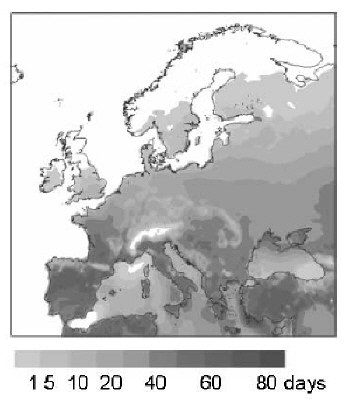The record-breaking heat wave that affected much of Europe in the summer of 2003 “took place 50 years too early” according to a Swiss climate scientist. Martin Beniston of the University of Fribourg says that last year’s heat wave was not like those that occurred in 1947 and 1976, and more like the conditions that might be expected towards the end of this century. He hopes that governments will use the heat wave as an indication of “a shape of things to come” to devise new strategies for coping with future climate change and global warming (M Beniston 2004 Geophys. Res. Lett. 31 L02202).

Beniston used the HIRHAM regional climate model developed by the Danish Meteorological Institute to run two 30-year simulations. The “current climate” simulation was run for the period from 1961 to 1990, while the “greenhouse-gas climate” simulation covered from 2071 to 2100.
For both periods, Beniston first studied the fluctuations in the daily maximum summer temperatures in Basel – a town in northwest Switzerland that is close to the French and German borders – averaged over July, August and September. He also analyzed the number of days in which temperatures exceeded 30°C. He found that 2003 was clearly the hottest summer since 1901.
He then extended the model to different parts of Europe and found that in the latter half of this century, summer temperatures would increase across much of the continent leading to a “northward shift” in climatic zones. This means that Switzerland could have a climate similar to that in the South of France today.
Beniston observed a general increase of about 4°C in a band stretching across central Europe to the Black Sea, with greater increases over the Iberian Peninsula and the south west of France. Moreover, he found that the number of hot days would increase – particularly in the Mediterranean region and in Eastern Europe – with an additional 40 to 60 days or more above 30°C (see figure). In comparison, the period 1961 to 1990 saw an average of around 10 days.
“Perhaps the media attention given to these and similar results might motivate policy-makers to start thinking about the long term – and the implications of such climate change on health, water availability and quality, food security and so on,” Beniston told PhysicsWeb.



